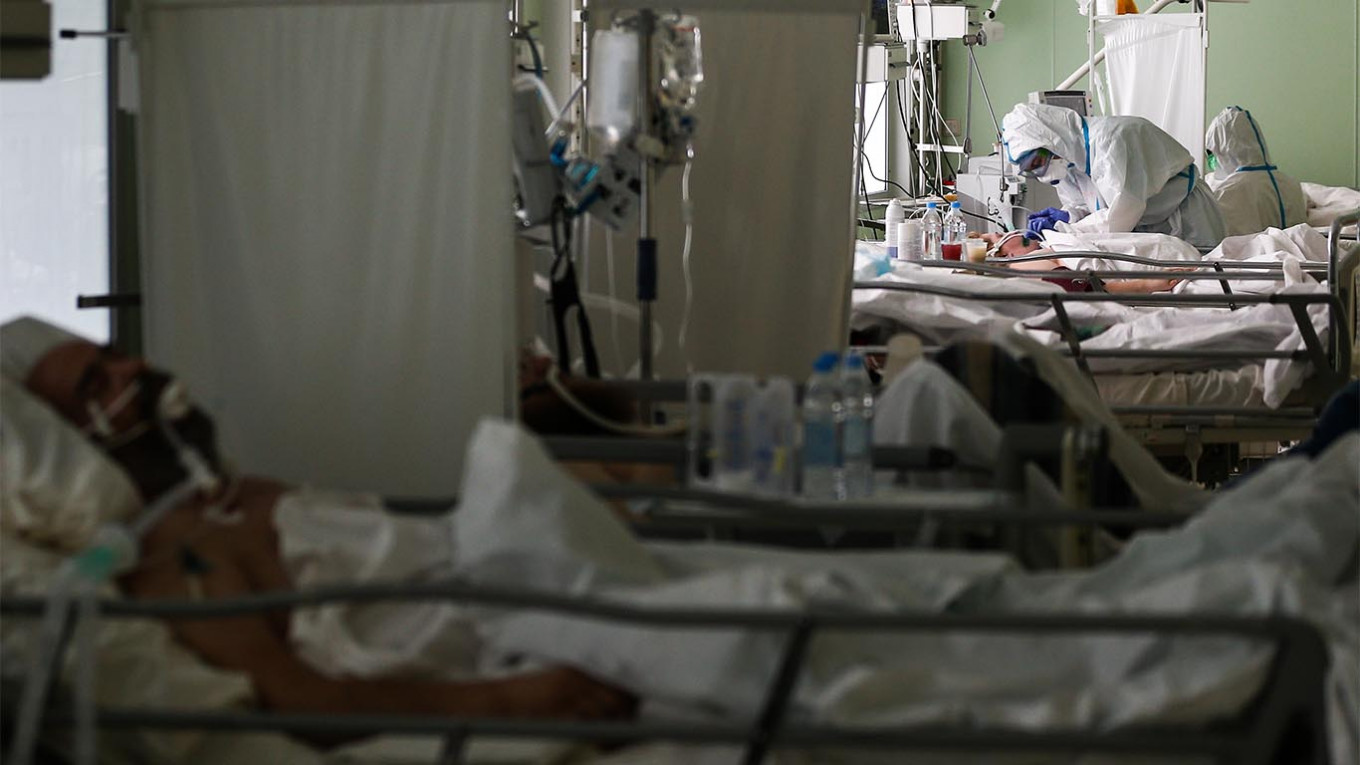Russia has rapidly become one of the epicenters of the deadly coronavirus pandemic, reporting the world’s fastest growth in infections with more than 10,000 new daily cases from May 2-13.
This week, Russia surpassed Britain, Italy and Spain to become the second most-infected country with 252,245 confirmed cases, behind the United States. Officials attribute the increase to mass testing and detecting asymptomatic cases not always counted in other countries.
The outbreak within Russia has hit several industries and communities in particular. Here’s an overview of the sectors which have been hardest-hit:
Hospitals
— Russian healthcare workers are disproportionately affected by coronavirus. Russia’s health minister told lawmakers on May 13 that Covid-19 outbreaks have appeared in 400 hospitals nationwide.
— About 2,000 medics have been infected in Moscow, 1,500 in St. Petersburg, almost 450 in southern Russia’s Krasnodar region, more than 200 in the republic of North Ossetia and more than 100 in the Buddhist republic of Kalmykia.
— Covid-19 has also affected nursing homes, with 120 elderly residents and staff in Smolensk west of Moscow and 99 children’s hospital patients in Moscow infected.
— An unofficial “list of memory” with the names of Russian and Belarussian medics who have died after being infected with Covid-19 listed 190 names as of May 14.
The military
— The Defense Ministry says 1,205 troops and cadets have tested positive for Covid-19 as of May 12.
— At least 376 cadets who were involved in rehearsals for the postponed Victory Day parade in April contracted the virus, according to a report by the Proekt investigative outlet.
— Draft boards are set to reopen May 12 and conscriptions to begin on May 20, Defense Minister Sergei Shoigu said.
Prisons
— More than 600 wardens and 145 prisoners have been confirmed to have Covid-19 as of May 13. Russia’s Supreme Court, following a request from the Federal Prison Service, urged judges to stop jailing suspects and people convicted for misdemeanors.
— Prisoners have complained of a lack of protective equipment like masks and the inability to observe social distancing guidelines in tight spaces. Activists say that prison officials have barred visitations, package deliveries — causing food and medicine shortages in some jails — and lawyers from visiting clients.
Energy
— 2,084 energy workers tested positive at natural-gas giant Novatek’s Belokamenka construction site in northern Russia’s Murmansk region as of May 13. Authorities opened a field hospital near the site and sent a cruise ship to house patients, and President Vladimir Putin on May 11 ordered the construction of a new field hospital in Belokamenka.
— More than 200 cases have been reported in the seaport of Sabetta on the Yamal peninsula 1,500 kilometers east, where the Velesstroy subcontractor involved in Novatek’s Belokamenka project is also building an LNG site.
— Overall, 1,037 energy workers tested positive in the Yamal-Nenets autonomous district as of May 13.
— One-third of the estimated 10,500 workers at a Gazprom subsidiary’s field in the Siberian republic of Sakha had Covid-19 as of early May, according to the Health Ministry. The regional governor, who vowed to evacuate 8,500 workers to their home regions where many end up testing positive, later said new tests showed around 600 cases among the workers.
— Three hundred and four workers have contracted the virus at Russia’s largest gold mine Olimpiada in the Krasnoyarsk region; its owner Polyus says the outbreak has not affected operations and the mine will stay open.
The church
— All 200 priests at the Russian-backed Kiev Pechersk Lavra monastery in the Ukrainian capital were reported to have tested positive for Covid-19 in April.
— At least 13 Russian clerics have died and many more are believed to have been infected. The Russian Orthodox Church’s spokesman has lashed out at critics for alleging a cover-up of its number of Covid-19 cases, saying “the information holds no public value” and “the spread of infection is no higher than among doctors, police officers and others.”
A Message from The Moscow Times:
Dear readers,
We are facing unprecedented challenges. Russia's Prosecutor General's Office has designated The Moscow Times as an "undesirable" organization, criminalizing our work and putting our staff at risk of prosecution. This follows our earlier unjust labeling as a "foreign agent."
These actions are direct attempts to silence independent journalism in Russia. The authorities claim our work "discredits the decisions of the Russian leadership." We see things differently: we strive to provide accurate, unbiased reporting on Russia.
We, the journalists of The Moscow Times, refuse to be silenced. But to continue our work, we need your help.
Your support, no matter how small, makes a world of difference. If you can, please support us monthly starting from just $2. It's quick to set up, and every contribution makes a significant impact.
By supporting The Moscow Times, you're defending open, independent journalism in the face of repression. Thank you for standing with us.
Remind me later.






